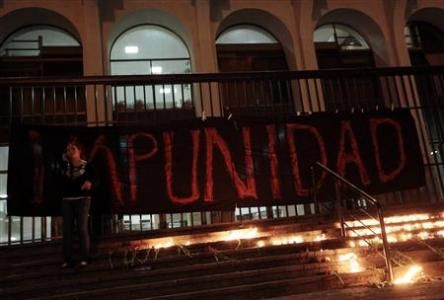
The Guatemalan war crimes tribunal, which found former dictator Efraín Ríos Montt guilty of genocide before the sentence was struck down by the country's constitutional court, announced last week that the re-trial would not begin until April 2014. The constitutional court had thrown out the decision and ordered a repeat of all trial proceedings taking place between April 19 -- when Rios Montt was briefly left without a lawyer after the one representing him stormed out in protest -- and May 10, when the 80-year prison sentence was handed down.
Witnesses who gave testimony to the tribunal on the massacres, pillages and rapes that took place in indigenous villages in the Guatemalan highlands of El Quiché are reportedly doubting whether they will return, having lost their faith that their testimony will yield justice.
RELATED: Former Dictator Returned To House Arrest As Conviction Overturned
RELATED: Former Soldier Hugo Reyes Implicates Current Guatemalan President In War Crimes
RELATED: Human Rights Advocates Condemn Rios Montt Annulment
During trial proceedings, 98 Ixil Mayan villagers testified to the court on the massacres taking place between March 1982 and August 1983, when the general, now 86, ruled over the country. Their faces obscured to conceal their identities, they told the court of women gang raped by soldiers, people who were forced to watch as their loved ones were tortured and killed, children abducted and crops destroyed, and entire communities of Ixiles who faced starvation after fleeing their villages. On April 4, one witness -- this one a former army mechanic who was serving in the region in the government's war against leftist guerillas at the time of the massacres -- drew audible gasps from the court when he implicated current Guatemalan President Otto Pérez Molina in the torching of villages and execution of villagers. Pérez Molina acknowledged that he had been a commander in the area, but denied having given any such orders.
But in the days after the Ixil witnesses gave their testimony, according to IPS News, a group of people came to Santa Maria Nebaj -- the community where they live -- claiming to be carrying out a census for a government agricultural development group. The supposed officials only visited the houses of witnesses, whose names and ID numbers they already knew. Suspicious villagers reported the incident to the local branch of the Center for Human Rights Legal Action (CALDH), which found that no record of the census group existed. CALDH filed a complaint with the Guatemalan human rights ministry, demanding guarantees that the witnesses would remain safe.
Still, the witnesses were determined. Antonio Caba told IPS in mid-April, "Since I started this struggle, I haven't been scared. I trust in what I'm saying. We need a real sentence."
Since then, however, some of them are reportedly changing their tone. CALDH spokesman José Rodríguez told IPS, "The victims have said that they're not toys to be called upon whenever. They trusted in justice and now they feel disappointed and frightened."
Some 1,771 Ixiles were killed in the massacres -- about 5.5 percent of Guatemala's Ixil population.
© 2025 Latin Times. All rights reserved. Do not reproduce without permission.




